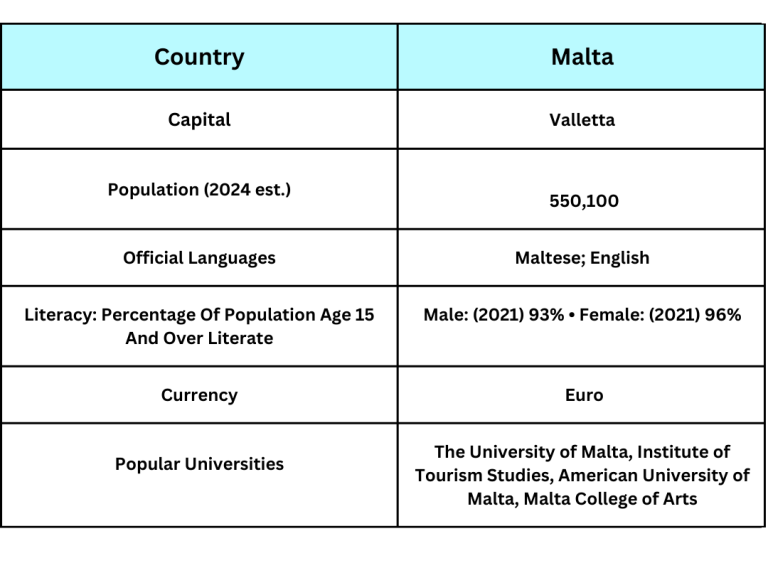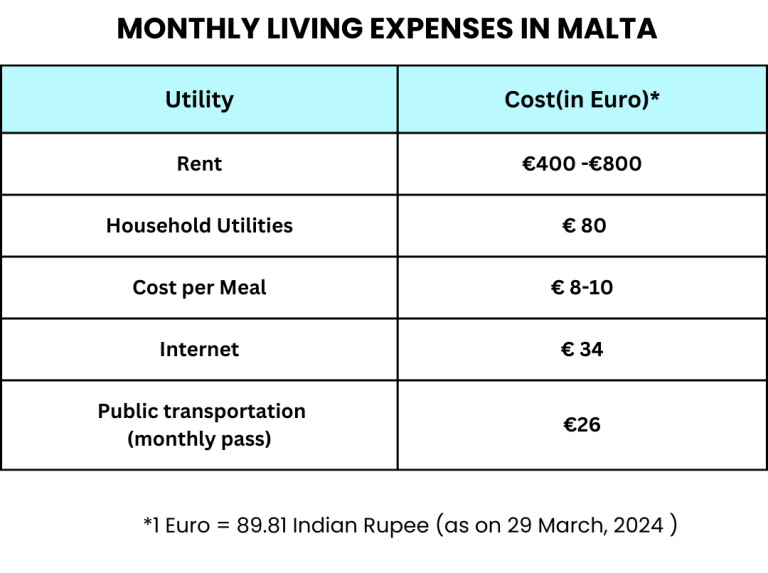In recent years, the interest in ‘Studying in Malta’ has significantly grown among international students. Malta, a stunning archipelago in the Mediterranean, is renowned not just as a tourist haven but also as a thriving center for high-quality education. In 2024, students contemplating their academic future in Malta will discover an environment that is both intellectually stimulating and culturally vibrant.
This blog aims to guide you through crucial aspects such as the cost of living and top universities. Let’s embark on a journey to explore the diverse facets of student life in Malta, a destination that offers much more than picturesque landscapes.

Cost of Living in Malta
When planning to study in Malta, understanding the cost of living is crucial. Rent in Malta can vary, with monthly costs ranging from €400 for a shared apartment to €800 for a private one-bedroom apartment in the city center. Groceries are reasonably priced, and a student can expect to spend around €200 to €300 monthly. Public transportation is efficient and affordable, with a monthly pass costing about €26. For recreation, Malta offers numerous affordable or even free options, from its beautiful beaches to historical sites for students who study in Malta.

Top 10 Institutions of Higher Education in Malta
- University of Malta
The University of Malta, located in Msida, is the highest-ranking institution in the country. Known for its comprehensive course offerings, it is particularly strong in humanities, arts, and sciences. It enjoys a robust international reputation and a vibrant student community for students who want to study in Malta.
- Malta College of Arts, Science, and Technology (MCAST)
MCAST is a vocational education and training institution. It offers programs in areas like arts, science, and technology, focusing on practical and industry-relevant skills. Its modern facilities and emphasis on hands-on learning make it a top choice for vocational studies for students who want to study in Malta.
- Middlesex University Malta Campus
As an extension of the Middlesex University in London, this campus provides quality British education with a focus on IT and business. The institution is known for its state-of-the-art facilities and a curriculum aligned with industry needs for students who want to study in Malta.
- American University of Malta (AUM)
AUM offers American-style higher education with a variety of programs in arts, business, and science. It is known for its liberal arts curriculum and its emphasis on fostering critical thinking and creativity for students who want to study in Malta.
- Institute of Tourism Studies (ITS)
ITS specializes in tourism and hospitality education, reflecting Malta’s strong tourism industry. It provides practical and theoretical training, preparing students who want to study in Malta for a dynamic and growing sector.
- St. Martin’s Institute of Higher Education
Focusing on business, computing, and creative arts, St. Martin’s offers courses validated by the University of London. It is known for its high academic standards and personalized learning approach.
- L-Università ta’ Malta (UoM)
UoM is another prominent higher education institution in Malta. It offers a broad range of courses and is especially recognized for its research output and academic excellence for students who want to study in Malta.
- Eden College Malta
Specializing in business, language, and healthcare courses, Eden College provides career-oriented education. Its programs are designed to meet the evolving needs of the global job market for students who want to study in Malta.
- Global College Malta
Known for its business, finance, and management programs, Global College Malta provides a curriculum that is both academically rigorous and industry-relevant, with a focus on the European market.
- London School of Commerce Malta
Part of the UK-based LSC Group, this institution offers undergraduate and postgraduate degrees in business and management. It stands out for its affordable fees and flexible learning options.
Eligibility Criteria for Malta Higher Education Providers
The eligibility criteria to study in Malta typically involve a good academic record and proficiency in the English language, as most courses are taught in English. For undergraduate programs, a high school certificate equivalent to the Maltese Matriculation Certificate is required. Postgraduate applicants should have a relevant bachelor’s degree. Additionally, non-EU students who want to study in Malta might need to meet specific visa requirements, including proof of funds and health insurance.
20 Advantages of Studying in Malta
- English-Speaking Country: Ease of communication and study for English speakers.
- Cultural Diversity: A melting pot of cultures and histories.
- Moderate Living Costs: Compared to other European countries, Malta is more affordable.
- Quality Education: Accredited and globally recognized institutions.
- Warm Climate: Enjoyable weather all year round.
- Strategic Location: Proximity to both European and African countries.
- Safe Environment: Low crime rates and high safety standards.
- Rich History: Historical sites offering a unique learning experience.
- International Community: Diverse student population from around the world.
- Work Opportunities: Part-time job options for students.
- Internship Prospects: Opportunities due to Malta’s growing economy.
- Networking: Interaction with professionals and academics globally.
- Travel Opportunities: Easy travel to nearby European countries.
- Student Support Services: Comprehensive support for international students.
- Cultural Activities: Numerous festivals and events.
- Outdoor Lifestyle: Beaches and outdoor activities abound.
- Small Size: Easy to navigate and personal feel to the educational experience.
- Quality Health Care: Access to excellent health services.
- Technology-Forward: Rapidly growing in fields like IT and iGaming.
- Graduate Opportunities: Increasing job prospects post-graduation, especially in sectors like technology, tourism, and business.
Choosing to study in Malta in 2024 offers a blend of quality education, cultural richness, and a safe, student-friendly environment. With moderate living costs and the added benefit of studying in an English-speaking country, Malta presents an attractive option for international students. The country’s educational institutions, from the prestigious University of Malta to specialized colleges like MCAST and ITS, offer a range of courses tailored to the evolving needs of the global job market.
The eligibility criteria for studying in Malta are straightforward, ensuring accessibility for students from diverse educational backgrounds. Moreover, the advantages of studying in Malta – from the beautiful Mediterranean climate to the ample opportunities for personal and professional growth – make it a top choice for students worldwide.
As you consider your options for studying abroad in 2024, Malta should certainly be on your list. Its unique combination of historical charm, modern education, and a welcoming international community creates an unparalleled study abroad experience. Remember, studying in Malta is not just about academic growth – it’s an adventure into a rich historical tapestry, a journey of personal discovery, and an opportunity to be part of an inclusive and dynamic community.
Malta, a small but vibrant archipelago in the Mediterranean Sea, boasts a society rich in history and culture, marked by a unique blend of traditions and influences. With a population of around half a million, Malta is known for its close-knit community, where familial and social bonds are strong and valued.
Historically, Malta has been a strategic naval base, and its society bears the imprints of various civilizations that have settled or conquered the islands, including the Phoenicians, Romans, Moors, Knights of Saint John, French, and British. This tapestry of influences is reflected in the Maltese culture, language – a Semitic language with heavy Italian and English influences – and the eclectic mix of architectural styles.
Religion plays a significant role in Maltese society, with the majority of the population identifying as Roman Catholic. This is evident in the numerous village feasts, or ‘festas’, celebrated throughout the year, honoring patron saints with processions, fireworks, and community gatherings – a testament to the Maltese spirit of celebration and community.
Despite its small size, Malta is a progressive society, known for its robust democratic traditions and active political engagement. It’s also one of the most densely populated countries in the world, which has fostered a sense of community and collectivism. In recent years, Malta has become increasingly cosmopolitan, attracting expatriates, digital nomads, and international students, adding to the cultural diversity and dynamism of the islands.
Maltese people are known for their hospitality and friendliness, always willing to help or engage in conversation. The society is resilient and adaptive, having overcome various historical challenges, which is reflected in the local attitude of resourcefulness and perseverance.
In conclusion, Maltese society is a fascinating blend of historical legacy and modern dynamism. Its rich cultural heritage, strong community ties, and welcoming nature make Malta not just a unique place to visit but also a warm and inclusive place to live.


